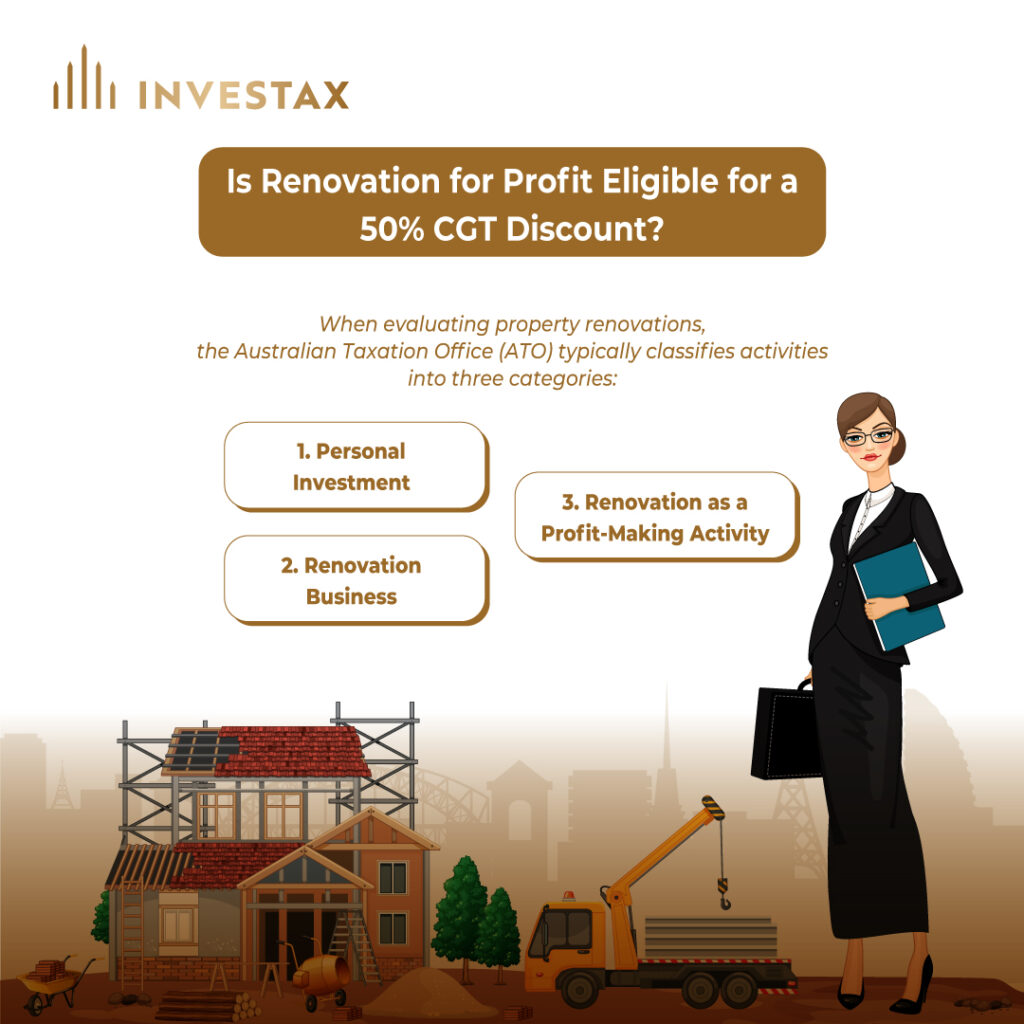Overview
Malia is a real estate agent and a successful property investor. She strategically purchased an investment property in Queensland for $850,000 using a Discretionary Trust structure. Her intention was to renovate the property and sell it at a higher price. At the time of purchase, the investment property was already rented, providing her with rental income while she completed her due diligence. This included obtaining building renovation quotes and organizing a suitable builder, a process that took eight months. By leveraging a Discretionary Trust and investing wisely in property, Malia aims to maximize her returns while minimising her tax burden, showcasing her expertise as a seasoned real estate investor.
Malia plans to sell the investment property for $1.2 million after the renovations are completed. The renovation is estimated to take four months and will cost her $150,000. During this period, she has chosen not to rent out the property, focusing instead on achieving her expected sale price post-renovation.
A key advantage of using a Discretionary Trust structure for this investment property is the 50% Capital Gains Tax (CGT) discount it offers. This tax benefit will significantly reduce her tax liability upon the sale of the property. To gain a clearer understanding of her tax obligations and to optimize her financial strategy, Malia has consulted with Investax Group.
Challenges
One of the key challenges in Malia’s case is determining the eligibility for the Capital Gains Tax (CGT) discount. Generally, the CGT discount is available to investors, not to individuals running a business. The challenge lies in identifying whether Malia’s renovation activities classify her as a business owner or if they can be considered a profit-making venture under her investment strategy. This distinction is crucial because if her renovations are deemed part of a business operation, she may not qualify for the CGT discount. Therefore, it is essential to carefully evaluate the nature of her renovation activities to ensure compliance with tax regulations and to optimize her financial outcomes.

Facts & Findings
When evaluating property renovations, the Australian Taxation Office (ATO) typically classifies activities into three categories:
- Personal Investment
- Renovation Business
- Renovation as a Profit-Making Activity
To determine the appropriate category, the ATO recommends that taxpayers consider the following questions when undertaking property renovations:
- Are the renovations regular and repetitive?
- What is the size and scale of the renovations?
- Is the renovation activity planned, organized, and carried out like a business?
- Is the activity conducted with the primary purpose of making a profit?
- Do you rely on the income generated from the renovations to meet your and your dependents’ regular expenses?
By carefully considering these questions, taxpayers can better understand how their renovation activities will be classified by the ATO and ensure compliance with relevant tax regulations.
In Malia’s case, the initial overview suggests that she intends to approach the renovation in a business-like manner. However, she does not plan to engage in such activities frequently. Malia understands that managing renovations can demand full-time attention, and she values her current job, which she does not wish to replace with renovation projects. Her primary focus remains on her career, and she sees this renovation as a one-time profit-making venture rather than a continuous business pursuit. This distinction is crucial in determining whether her activities qualify for the income tax on profit, GST assessment and Capital Gains Tax discount.
Tax Outcome
- Personal Investment
If you only undertake small, infrequent renovations to make the property liveable, and your primary intention is not to make money from the renovations, you will generally be considered an investor. The key factor is that your activities are occasional and aimed at maintaining the property’s habitability rather than generating profit through frequent and extensive renovations. This distinction helps ensure that you qualify for investor status and the associated Capital Gains Tax (CGT) benefits. The tax outcomes for this are as follows:
- The sale will be treated as a capital gain if the sale proceeds exceed the cost and renovation expenses of the property.
- Capital gain concessions, such as the CGT discount and the main residence exemption, may apply to reduce your capital gain.
- You can apply any capital losses you have to reduce the profit from the sale of the property, which is considered a capital gain.
- Renovation Business
The ATO considers several factors to determine if property renovation constitutes a business. Key characteristics include a clear profit-making intention, regularity, and repetition of renovation activities, and an organized, business-like approach. Activities such as thoroughly researching the real estate market, attending investment seminars, setting up an office for property management, and systematically monitoring the property market all indicate a business operation. Additionally, dedicating significant time and resources to the renovation projects, such as leaving a primary job to focus on property improvement, further supports the classification as a business. If these factors are present, the ATO is likely to regard the renovation activities as a business of property renovation, impacting tax obligations and eligibility for certain concessions. If you are considered a renovation business entity, the tax outcomes will be:
- The property will be regarded as trading stock.
- All the costs of acquisition and renovation will form part of the trading stock until sold.
- The profit on sale will be treated as business income, not as capital gain,
- No discount will be allowed for CGT even if you hold on to the property for more than 12 months.
- You may be required to register for GST if you are conducting substantial renovations on any particular property.
- Renovation as Profit Making Activity
There is not much difference between renovation for business and renovation as a profit-making activity. Renovation for business operates like a general business, whereas renovation as a profit-making activity can be a one-off, non-frequent endeavour. The ATO considers a property renovation as a profit-making venture if the activities demonstrate a clear intention to make a profit. Key characteristics include purchasing a property specifically to renovate and sell for a profit, conducting thorough research on potential properties (including renovation costs, buying and selling expenses, and timeframes), and planning the renovation in detail, including stages, costs, and contractor needs. Completing the renovation according to the planned schedule and carrying out the activities in a business-like manner, similar to professional renovation businesses, further indicate a profit-making intention. When these criteria are met, the profits will be treated as business income rather than capital gains, affecting the applicable tax treatment.
If your property renovation is considered a profit-making activity, the tax outcomes will be as follows:
- The net profit will be taxed in your tax return.
- It will not be considered a capital gain (CGT).
- No CGT discount will be allowed.
- If there is a loss from the profit-making activity, you may be able to use the loss against other income.
- You may be required to register for GST if you are conducting substantial renovations on any particular property.
Conclusion
After receiving all the necessary information on how the ATO treats property renovations, Malia is planning different tax strategies to minimize her tax liability. By strategically placing her property in a Discretionary Trust structure, she can implement various tax strategies to reduce her tax burden. With her cash flow in order, Malia is ready to adopt a new investment strategy to optimize her returns and recoup the tax from the profit.
If you are in a similar situation and finding it difficult to get guidance from your current accountants, contact us at Investax Group, property and business tax specialists. Our team can provide you with expert advice and tailored strategies to help you navigate complex tax regulations and maximize your investment potential.

Pro Tips
Here are some pro tips to help out with your property renovation journey:
- Understand Your Investment Strategy:
- Clearly define whether your renovation activities are intended as a one-time profit-making venture or as part of a continuous business operation.
- Evaluate your renovation activities against the ATO’s criteria to determine if they classify as personal investment, a renovation business, or a profit-making activity.
- This distinction can significantly impact your tax obligations and eligibility for the CGT discount.
- Leverage Trust Structures:
- Consider using different structures for different property investment, renovation or business activities.
- A Discretionary Trust structure for property investments to potentially benefit from tax advantages, including the 50% CGT discount.
- Consult with a tax professional to ensure this aligns with your overall financial strategy.
- Stay Informed on Tax Implications:
- Keep updated with the latest tax regulations and guidelines from the ATO regarding property renovations. Understanding these can help you make informed decisions and avoid potential pitfalls.
- Consult with Tax Experts:
- Engage with tax specialists, such as those at Investax Group, to receive tailored advice and strategies. Professional guidance can help you navigate complex tax regulations and optimise your investment returns.
- Plan for Potential Tax Outcomes:
- Be prepared for different tax treatments based on your renovation activities. Whether your activities are classified as a personal investment, business, or profit-making venture, each has distinct tax implications that you should plan for accordingly.
- Document Your Activities:
- Keep detailed records of all renovation activities, expenses, and income. This documentation can be crucial in supporting your case if the ATO reviews your tax treatment.
- Evaluate the Financial Feasibility:
- Before embarking on a renovation project, carefully evaluate the financial feasibility.
- Consider the cost of renovations, potential sale price, and the impact of tax obligations on your overall profit.
- Consider the Long-Term Impact:
- Think about the long-term impact of your renovation activities on your overall investment portfolio. Balancing immediate profit with long-term investment goals can help you make more strategic decisions.
By following these pro tips, property investors can better navigate the complexities of tax regulations related to property renovations and maximise their investment potential while minimising tax liabilities.


